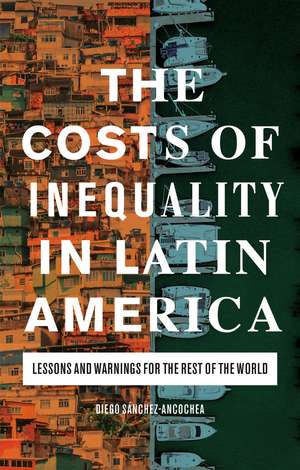The Costs of Inequality in Latin America: Lessons and Warnings for the Rest of the World
Autor Diego Sánchez-Ancocheaen Limba Engleză Paperback – 9 dec 2020
| Toate formatele și edițiile | Preț | Express |
|---|---|---|
| Paperback (1) | 157.85 lei 6-8 săpt. | +24.99 lei 6-12 zile |
| Bloomsbury Publishing – 9 dec 2020 | 157.85 lei 6-8 săpt. | +24.99 lei 6-12 zile |
| Hardback (1) | 465.72 lei 6-8 săpt. | +42.43 lei 6-12 zile |
| Bloomsbury Publishing – 9 dec 2020 | 465.72 lei 6-8 săpt. | +42.43 lei 6-12 zile |
Preț: 157.85 lei
Preț vechi: 172.38 lei
-8% Nou
Puncte Express: 237
Preț estimativ în valută:
30.20€ • 31.47$ • 25.01£
30.20€ • 31.47$ • 25.01£
Carte tipărită la comandă
Livrare economică 03-17 aprilie
Livrare express 26 februarie-04 martie pentru 34.98 lei
Preluare comenzi: 021 569.72.76
Specificații
ISBN-13: 9781838606237
ISBN-10: 1838606238
Pagini: 216
Dimensiuni: 138 x 216 x 18 mm
Greutate: 0.25 kg
Editura: Bloomsbury Publishing
Colecția I.B.Tauris
Locul publicării:London, United Kingdom
ISBN-10: 1838606238
Pagini: 216
Dimensiuni: 138 x 216 x 18 mm
Greutate: 0.25 kg
Editura: Bloomsbury Publishing
Colecția I.B.Tauris
Locul publicării:London, United Kingdom
Caracteristici
Shows how this unequal region first experienced problems that are now increasingly evident in many wealthy and emerging economies
Notă biografică
Diego Sánchez-Ancochea is the Head of the Oxford Department and International Development and Professor of Political Economy of Development at the University of Oxford. He is also the associate editor of Oxford Development Studies, He has co-authored two monographs with Juliana Martínez Franzoni, Good Jobs and Social Services: How Costa Rica Achieved the Elusive Double Incorporation (2013) and The Quest for Universal Social Policy in the South: Actors, Ideas and Architectures (2016).
Cuprins
1. Introduction: Lessons from the Land of Inequality1.1. Inequality is growing in developed countries. and it is even higher in Latin America1.2. Exploring inequality through case studies1.3. The book's argument: the economic, political and social costs of inequality1.4. How do we move from here? Some Latin American lessons1.5. The rest of the book2. Latin America: Always the Most Unequal Region?2.1. The most unequal region in the world?2.2. It is about the rich, stupid!2.3. Always Unequal?2.4. No longer an exception: growing inequality in other parts of the world3. The Economic Costs of Inequality: Poor Education, Lack of Innovation and Economic Crises3.1. A historical excursion3.2. The problem of education today3.3. Inequality limits the opportunities to create more dynamic economies3.4. The difficulties to tax the rich3.5. Income inequality and financial crises3.6. From the economy back to inequality3.7. From Latin America to the rest of the world4. The Political Costs of Inequality: Weak Democracies and Populist Solutions4.1. The uncomfortable coexistence of democracy and elite power4.2. The first wave of populism as a response to the democratic deficit4.3. Coming to the present: the limits of democracy and a new populist response4.4. Authoritarian breaks as extreme elite responses4.5. From politics back to inequality4.6. From Latin America to the rest of the world5. The Social Costs of Inequality: Violence, Social Mistrust and its Consequences5.1. The most unequal and most violent region at the same time5.2. Inequality contributes to mistrust in neighbours and institutions5.3. Inequality, discrimination and racism5.4. From social problems back to inequality: the difficulties to create redistributive coalitions5.5. From Latin America to the rest of the world: some warning signs6. Changing Courses6.1. Latin America as a warning to the rest of the world 6.2. The unexpected reduction of inequality in Latin America during the 2000s6.3. What can Latin America do to reverse courses?6.4. An agenda for equity in the rest of the world6.5. Conclusion: hope or disappear?
Recenzii
This is an excellent work on the complexities of inequality in Latin America and the lessons we can learn from ideas, social movements, and policies developed in middle income countries to reduce income and wealth inequality. This very important book is a must-read both for scholars of development studies and Latin American politics as well as for practitioners seeking to reduce inequality in developing and developed economies.
A compelling case for the urgency of tackling inequality, in Latin America and the world, without falling into the temptation of a silver-bullet approach. Thanks to Diego's insightful book, we now have a better understanding of the policies, politics and history of Latin American inequality. This book will be useful to succeed in the battle against social injustice in the region.
A compelling case for the urgency of tackling inequality, in Latin America and the world, without falling into the temptation of a silver-bullet approach. Thanks to Diego's insightful book, we now have a better understanding of the policies, politics and history of Latin American inequality. This book will be useful to succeed in the battle against social injustice in the region.
